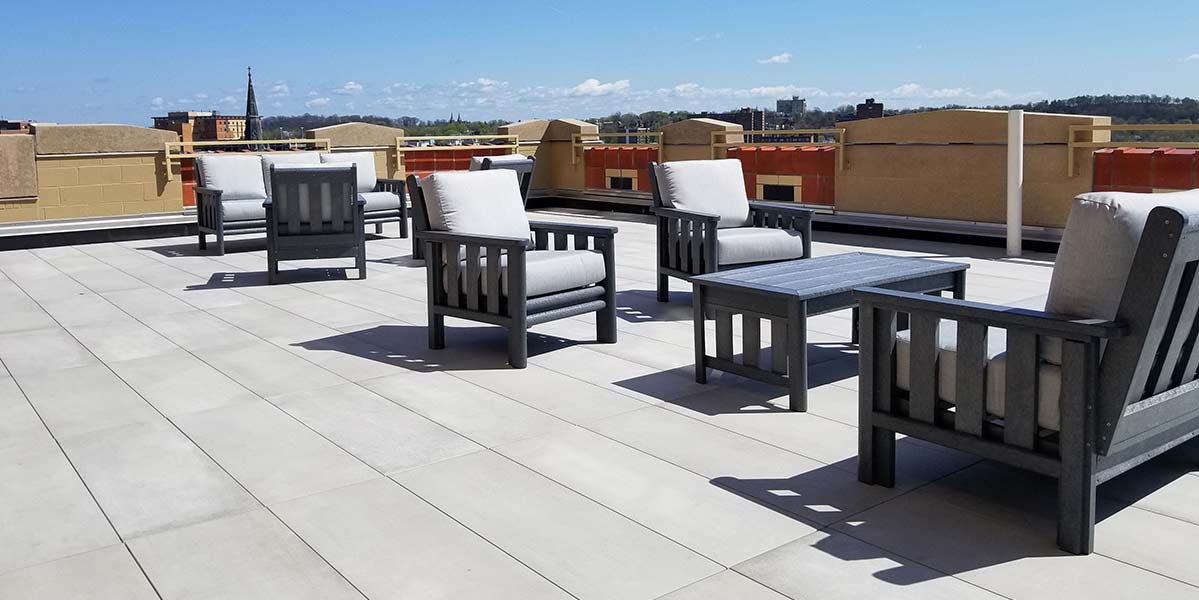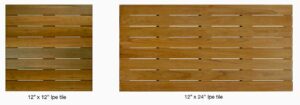Modern architecture increasingly leverages rooftop spaces to create functional and aesthetic outdoor environments. Whether it’s a residential terrace, a commercial building’s rooftop lounge, or a green roof, these elevated spaces require durable and efficient systems to accommodate traffic, drainage, and design demands. The integration of rooftop spaces has become particularly crucial in urban centers where real estate optimization is paramount, and sustainable design practices are emphasized.
Pedestal paver systems have emerged as a leading choice for transforming rooftops into durable, level, and visually appealing environments. Utilizing adjustable height pedestals with porcelain, Ipe wood, or concrete pavers, these systems offer exceptional design flexibility while addressing technical challenges such as rooftop weight limits, job site access, membrane protection and wind uplift. The versatility of materials allows architects and designers to create sophisticated spaces that complement both contemporary and traditional architectural styles.
What Is a Pedestal Paver System?
A pedestal paver system is an elevated or ‘floating’ paving solution designed to create a stable, level surface on rooftops, balconies, or other uneven areas, without using adhesives or mortar to permanently fix the pavers to the rooftop surface. Adjustable pedestals act as the foundation for the elevated paver system, acting primarily as a deck leveling system, securely supporting the pedestal roof pavers and enabling precise height adjustments to be made. Pedestals typically feature self-leveling heads, incremental height adjustment and slope compensation mechanisms to ensure perfectly level and accurately aligned pavers regardless of the substrate conditions.
Pedestal paver systems are ideal for both residential and commercial rooftop deck flooring because they provide superior drainage, are comparatively easy to install, accommodate different paver sizes, thicknesses, layouts and deck elevations, and achieve the desired result without needing extensive steel or lumber foundation structures.
Applications
- Rooftop Paving: Transform flat or sloped rooftops into elegant outdoor living spaces for relaxation, dining, or socializing.
- Roof Terraces and Balconies: These systems create seamless, level surfaces that enhance the usability and visual appeal of balconies and terraces.
- Green Roofs: The elevated nature of pedestal systems makes them compatible with green roof installations by allowing for proper drainage and access to infrastructure below.
- Pool Decks and Courtyards: Perfect for creating slip-resistant, level surfaces around swimming pools and in courtyard settings, while facilitating proper drainage and reducing maintenance requirements.
- Rooftop Bars & Restaurants: For high traffic locations, 3cm thick porcelain pavers offer an exceptionally appealing and low maintenance surface that resists staining, scuffing and general wear.
Key Components of a Pedestal Paver System
Adjustable Deck Pedestals
Adjustable height pedestals form the backbone of a pedestal system deck. These are engineered supports that can be customized to achieve the desired height and level surface. Made from durable materials such as polypropylene or other engineered plastics, these paver supports resist harsh weather conditions, UV exposure, and weight stress. For totally non-combustible roof decks, adjustable height steel pedestals are also available.
The adjustability allows for easy correction of sloped surfaces, accommodating inclines up to several degrees, ensuring a perfectly level finished area. Adjustable pedestals also come with integrated features such as self-leveling heads and acoustic pads to reduce noise and improve stability.
At the lowest deck heights, (up to about 1 1/2″) pavers are normally supported by stackable rubber support pads fitted with spacer tabs to ensure precise and consistent spacing of the pavers. These pads are also useful in reducing noise transmission and adding some extra shock protection.
Paver Options
Pedestal systems are compatible with a variety of paver materials, each offering unique benefits:
-
- Porcelain Pavers: Lightweight yet very durable, porcelain pavers are resistant to water, stains, and moss and algae growth They come in an exceptionally wide range of colors, textures, and patterns, including wood look, stone look, modern designer colors and even concrete look.
- Porcelain Pavers: Lightweight yet very durable, porcelain pavers are resistant to water, stains, and moss and algae growth They come in an exceptionally wide range of colors, textures, and patterns, including wood look, stone look, modern designer colors and even concrete look.
-
- Ipe Wood Deck Tiles: Known for their rich, natural appearance and exceptional hardness, Ipe wood tiles are popular for creating warm, luxurious outdoor spaces. This tropical hardwood is naturally resistant to rot, insects, and weathering, making it an ideal option for those who yearn for a natural wood look despite the additional maintenance requirements.
- Ipe Wood Deck Tiles: Known for their rich, natural appearance and exceptional hardness, Ipe wood tiles are popular for creating warm, luxurious outdoor spaces. This tropical hardwood is naturally resistant to rot, insects, and weathering, making it an ideal option for those who yearn for a natural wood look despite the additional maintenance requirements.
- PreCast Concrete Pavers: Offering high load bearing capacity, concrete pavers are useful for heavy-traffic areas but are subject to staining and lack the variety of colors available with porcelain pavers.
Benefits of Pedestal Paver Systems
-
Enhanced Drainage
One of the standout advantages of roof a roof paving system using paving pedestals is their ability to offer enhanced surface drainage. By elevating the deck surface, rainwater and runoff can flow freely through the gaps between the pavers, and drain away beneath the pavers, preventing water pooling. This makes these systems especially valuable in areas prone to heavy rain or extreme weather conditions.
-
Ease of Installation
Pedestal systems eliminate the need for adhesives, mortar, or grouting, simplifying the installation process. The modular nature of these systems allows for quick assembly and reduces labor costs significantly.
-
Easy Maintenance and Accessibility
The modular design allows for individual pavers to be removed without disturbing the entire surface, providing easy access to plumbing, utility conduits, or waterproofing membranes beneath. If repairs or adjustments are needed, individual pavers can be easily removed without disturbing the entire surface. The system also allows for easy cleaning and replacement of damaged pavers without compromising the integrity of the entire installation
-
Customizable and Versatile
Roof paving systems using adjustable pedestals and porcelain pavers, Ipe wood tiles or pre-cast concrete pavers offer almost endless design possibilities. Architects and designers can easily create a much wider range of designs than with conventional wood or composite wood decking materials with layouts that are tailored to suit specific project requirements, from minimalist modern aesthetics to rustic natural looks.
-
Ensures Level Surfaces on Sloping Substrates
The adjustable height roof deck pedestals can compensate for sloped or uneven substrates, ensuring a perfectly level surface without additional structural modifications. Height adjustments can be made from ¼” up to several feet, accommodating both slight irregularities, and significant grade changes. This flexibility allows for proper drainage slopes underneath while maintaining a level walking surface above, crucial for both safety and aesthetics.
-
Reduced Transmission of Noise and Heat
The air gap underneath the elevated pavers can reduce sound transmission and provide a degree of insulation, minimizing heat transfer into the building. This air space acts as a thermal buffer, helping to reduce cooling costs in summer months. The roof paving system also helps dampen footfall noise and mechanical vibrations, making it ideal for rooftop amenity spaces in residential buildings or hotels.
-
Durability and Longevity
The materials used in pedestal paver systems are designed to withstand the challenges of outdoor exposure, including UV radiation, temperature fluctuations, and heavy loads. Porcelain, Ipe wood, and concrete are all highly durable, ensuring the longevity of the roof deck system.
-
Eco-Friendly Solutions
Many pavers are made from sustainable or recyclable materials, while Ipe wood tiles can be sourced from responsibly managed forests. Pedestal supported roof decks can ensure proper drainage, better insulation, reduced heat transfer and may contribute to LEED certification points. Roof deck systems can also support green roof initiatives by integrating with vegetated roof top environments.
Disadvantages of Pedestal Paver Systems
-
Weight Considerations
While lightweight materials like porcelain reduce the load, the overall weight of a pedestal paver system can be significant, requiring careful assessment of the rooftop’s structural capacity. Building engineers must conduct load calculations that account for both dead loads (permanent weight) and live loads (people, furniture, snow). Some older buildings may require structural reinforcement before installation, adding to project costs.
-
Complex Installation for Larger Projects
Large-scale commercial installations may require more professional expertise to ensure accurate placement, height adjustment, and alignment of both pavers and pedestals. The complexity increases when dealing with irregular roof shapes, multiple drainage points, or HVAC equipment integration. Installation teams may need specialized training in height adjustment techniques, slope compensation, and proper spacing requirements.
-
Wind Uplift Considerations
Any elevated pavers laid without adhesives or other hold down devices on a rooftop, balcony or other exposed area, will be subject to the force of wind, with the risk in some cases of the pavers becoming airborne, requiring specifiers to give adequate consideration to the installation of wind uplift mitigation systems such as devices designed to hold paves in an interconnected array.
-
Potential Material-Specific Challenges
- Porcelain Pavers: Although durable, they can crack under extreme point loads or impacts. They require specialized cutting tools and expertise for custom fits.
- Ipe Wood: Requires regular maintenance, such as sealing, to preserve its appearance and prevent weathering. All wood is susceptible to mold growth in consistently damp conditions, and is easily stained by oil etc. Also, wood decks may be prohibited is some locations due to fire risk.
- Concrete Pavers: Their weight may make them less ideal for buildings with load restrictions. Prone to efflorescence and staining over time, and freeze-thaw cycles can cause deterioration. Surface can become rough and porous with age
Summary
Roof deck pedestal paver systems are an innovative solution for transforming rooftops into functional and attractive spaces. By using adjustable height pedestals and roof deck pavers such as porcelain, Ipe wood, or concrete, roof deck pedestal systems address challenges like uneven surfaces, drainage, and accessibility while offering exceptional design flexibility.
With their ease of installation, superior drainage capabilities, and customizable designs, roof paver systems using adjustable pedestals are a smart investment for residential and commercial projects alike. By leveraging the benefits of these advanced systems, property owners can unlock the full potential of their rooftops, turning them into valuable, usable spaces that enhance both form and function.
Whether using porcelain pavers for a sleek, modern look, Ipe wood for a natural touch, or concrete for robust performance, these systems provide unparalleled versatility for creating stylish, elevated outdoor environments that stand the test of time.






